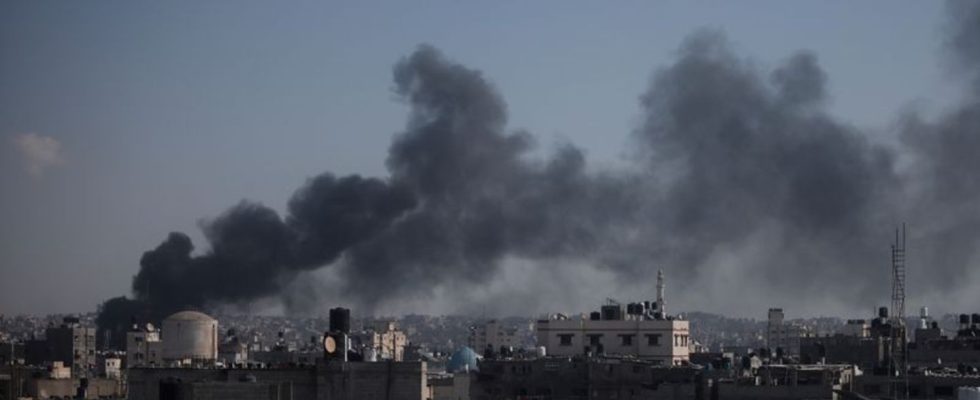War in the Middle East
Israel: Hamas structure dismantled in the north
Smoke rises over buildings after an Israeli airstrike. photo
© Mohammed Dahman/AP/dpa
The Hamas structures in the Gaza Strip continue to crumble. Israel also claims to have obtained new information about a long-hidden mastermind of the October 7th attack. The overview.
Hamas structure dismantled in northern Gaza
On Sunday night, Israel’s army published videos on X (formerly Twitter) about the operation in the north of the Gaza Strip. Spokesman Daniel Hagari said Hamas had two brigades with 12 regiments in the north before the war began. “In total there were about 14,000 terrorists,” he said. Since then, numerous commanders have been killed and weapons and ammunition destroyed. The soldiers found underground tunnels and demolished them.
According to Hagari, eight kilometers of underground tunnels and 40 entrances were found in the refugee district of Jabalia alone. Hamas no longer functions in an organized manner in this area. “There are still terrorists in Jabalia, but now they operate without a framework and without commanders.” However, he expects continued sporadic rocket attacks on Israel from this area. The army says it now wants to concentrate on destroying Hamas structures in the center and south of the Gaza Strip. According to Israel, around 8,000 terrorists have been killed so far.
The Gaza war was triggered by the devastating terrorist attack by Hamas and other extremist Palestinian groups on October 7th. Israel responded with massive air strikes and a ground offensive. According to the Hamas-controlled health authority, 22,600 people have been killed in the Gaza Strip since then. In view of the catastrophic humanitarian situation in the sealed-off coastal area and the high number of civilian casualties, Israel has recently come under increasing international criticism.
Possible photo of Hamas phantom
In the course of the offensive, Israel also appears to have gained new information about a Hamas leadership member who has gone into hiding. The army released a photo purporting to show the head of Hamas’ armed wing, Mohammed Deif. It shows a gray-haired, bearded man holding several banknotes in his left hand and a plastic cup with a liquid in his right hand. Until the war began, Israel only had very old photos of the man considered one of the central masterminds of the terrorist attack. A newer picture of Deif surfaced in December. For years he was considered a phantom and survived numerous attempts to kill him by Israel.
Israel had long assumed that Deif had lost several limbs. But in December, Israeli media reported that the army had found a video showing Deif with both arms and both legs. “Together with (domestic intelligence agency) Shin Bet, we interrogated terrorist activists,” Hagari said. “The result was that we obtained information about senior Hamas leaders, including documentation from Mohammed Deif and also information about Hamas leaders who are outside the Gaza Strip.”
Shelling in northern Israel
In addition to the fighting in Gaza, there was also renewed shooting on Israel’s northern border with Lebanon. The Shiite militia Hezbollah said it fired a total of 62 rockets at Israel on Saturday, more than usual. The militia, allied with Iran and Hamas, targeted a military base near Meron in northern Israel. Hezbollah said the attack was an “initial response” to the killing of the Islamist Hamas’ second-highest leader abroad, Saleh al-Aruri, in Beirut on Tuesday. She suspects Israel was behind the crime.
Because of Al-Aruri’s killing, the Gulf emirate of Qatar assumes that another deal to release hostages from Hamas could be difficult. The news portal “Axios” reported this on Sunday night, citing an Israeli source and a Qatari official. Qatar’s Prime Minister Mohammed bin Abdulrahman Al Thani said this to several families of Israeli hostages who met him in the capital Doha.
More dead according to Hamas authorities
Meanwhile, people continue to die in Israeli attacks in the Gaza Strip: the number of residents killed rose to 22,722, the Hamas-controlled health authority announced on Saturday. That was 122 more than the day before. In addition, a total of 58,166 injuries were registered, 256 within 24 hours. The Israeli army continued its fight against Hamas in various parts of the coastal strip, which is only around 40 kilometers long and between 6 and 12 kilometers wide. In the heavily contested city of Khan Yunis in the south of the Gaza Strip, an unspecified number of opponents were killed and entrances to Hamas tunnels and weapons depots were destroyed.
Chief diplomats on a trip to the Middle East
US Secretary of State Antony Blinken visited Jordan’s capital Amman in the hope of encouraging a de-escalation of the conflict. “Jordan is a crucial partner in helping to prevent the conflict from spreading in the region,” wrote Blinken’s spokesman Matthew Miller on X on Sunday night. Blinken also wanted Qatar, the United Arab Emirates, Saudi Arabia and Visit Israel, the West Bank and Egypt. At the same time, EU chief diplomat Josep Borrell campaigned for de-escalation in Lebanon.
What will be important on Sunday
Federal Foreign Minister Annalena Baerbock is traveling to Israel again. At the start of her visit, the Green politician wanted to meet her new counterpart Israel Katz. A conversation with President Izchak Herzog was also planned. It is likely to be about efforts to release the hostages kidnapped by the Islamist Hamas. The humanitarian situation of the people in the Gaza Strip and a possible two-state solution after the end of the Gaza war are also likely to be discussed. US Secretary of State Blinken is also on a trip to the Middle East and is expected to visit Israel, among other places, in the coming days.

